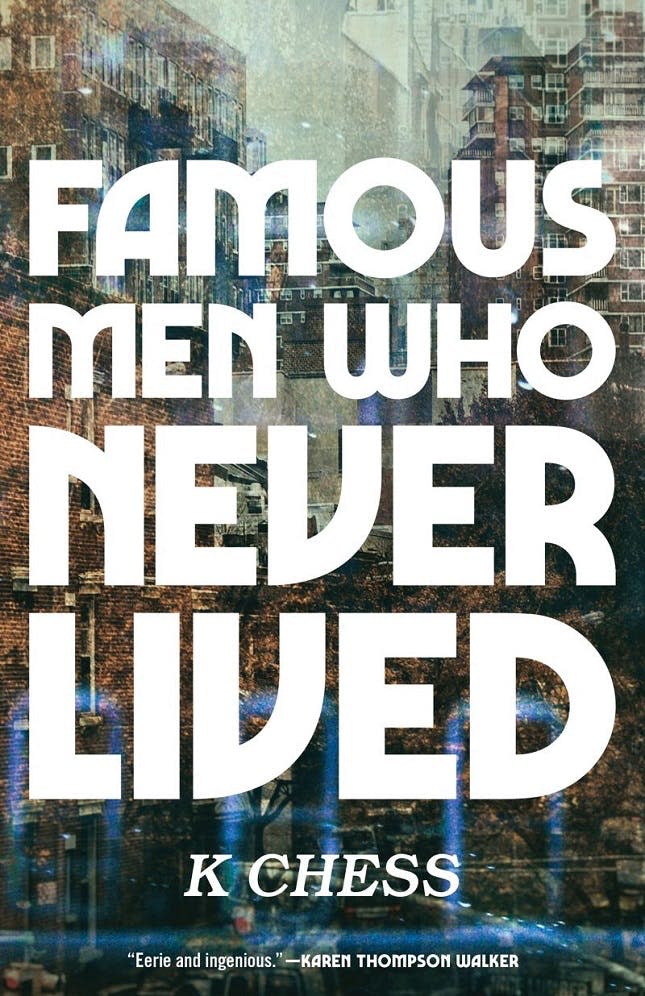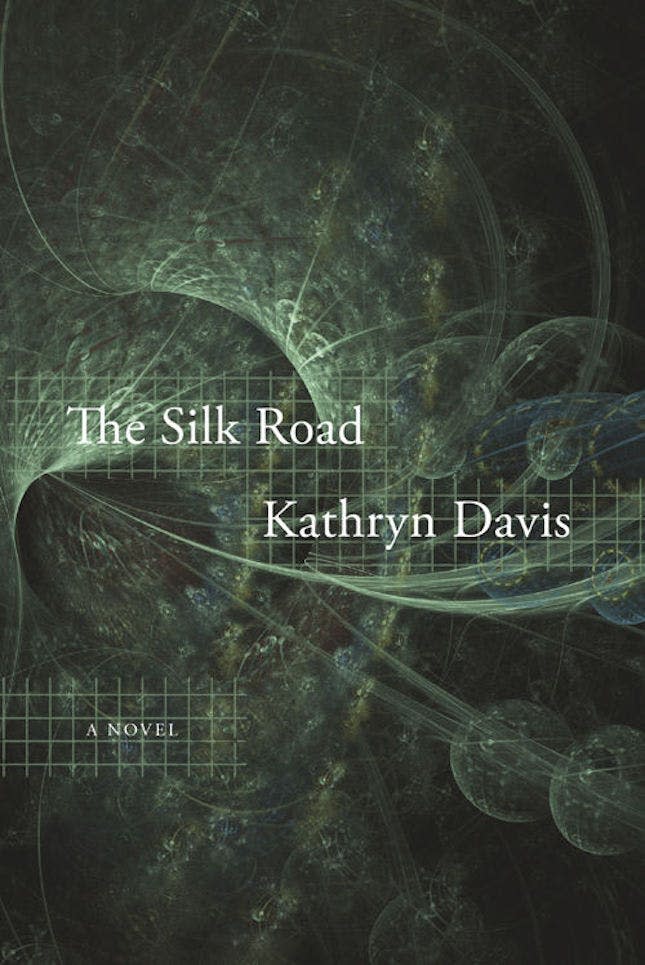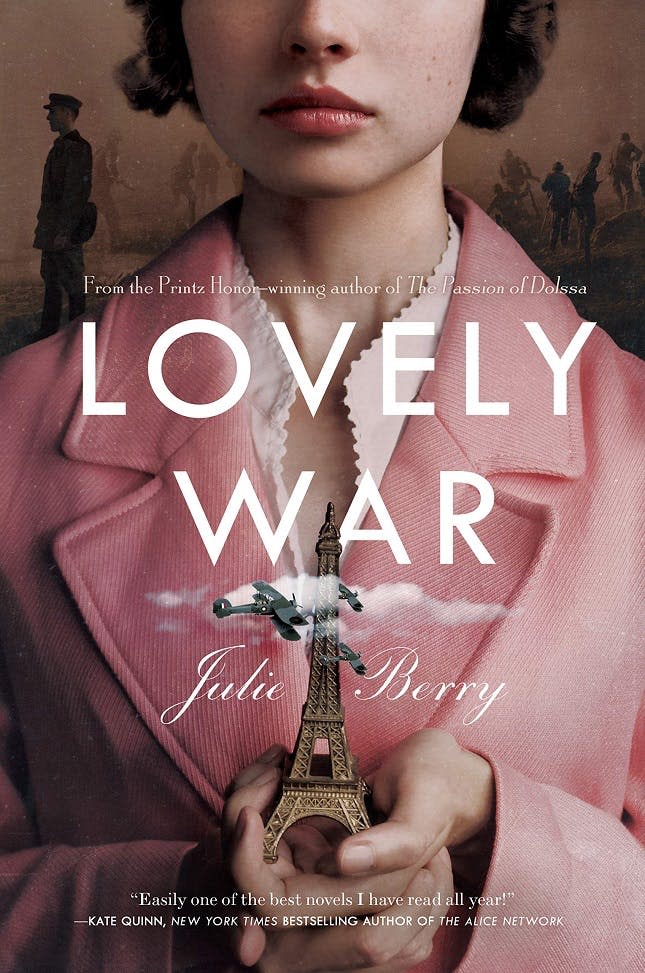3 New Books About the Power of Stories to Change the World
Storytellers have great power. They shape the mythos that creates societal identity, take the pulse of their moment’s cultural zeitgeist, and even, sometimes, create what we see as historical truth. The three new books in this week’s book club are all about the world-building, long-lasting power of the story — whether the story is real or fictional.
1. Famous Men Who Never Lived by K Chess ($25): Hel and her partner Vikram live in New York City. But it’s a different New York than they grew up in — not because of gentrification, but because of a split in reality. In Hel and Vikram’s universe, a nuclear war begins, threatening to destroy the city and the world. Luckily, a new, barely-tested invention offers a way out by creating a portal between universes; drawn by lots, several thousand refugees manage to flee into the unknown before the portal slams shut, possibly forever. Cautiously accepted into the new world, they become UDPs: Universally Displaced Persons. Differences between language, social and political movements, and technologies force UDPs to live life more than slightly askew, like wearing a pair of glasses with the wrong prescription.
Hel becomes increasingly sure that it all comes down to one storyteller: the author Ezra Sleight. Celebrated in Hel’s universe as a prescient sci-fi writer who delivered powerful social commentary along the lines of Kurt Vonnegut, Jr., Sleight was born at the turn of the 20th-century in both universes. His books, particularly his magnum opus The Pyronauts, encouraged social change and formed the basis for Vikram’s dissertation. At least, in Hel and Vikram’s world, they did. In our New York, Sleight died as a 10-year-old child — and then the timelines diverged. Hel, a dissolute and depressed former surgeon who is in no way enjoying the reorientation sessions the UDPs legally have to attend, discovers a new mission once she locates Sleight’s childhood home up for sale: She wants to turn it into a museum, not just for Sleight’s works, but for cherished objects and memories from a universe that may no longer exist. But whether she will meet with anything but resistance from a world that doesn’t share her stories remains to be seen.
“Hel was glad he’d chosen books…She teased him though, about his choice of titles. Why just literature – no science, no books on technology?…On the whole, Vikram made his selections with wisdom and luck. He’d saved novels by Darby Kenyon, by Grant Wilder, by Samara Vaugh. He’d preserved poetry by Nakamura Hideki rendered into luminous English by renowned translator A.J. Butler. These bestsellers, prizewinners, and canonical works existed in unique volumes on Hel and Vikram’s shared bookshelf in the Bronx. And he’d rescued an electrostat draft of his own unfinished dissertation, as well as the novel it treated. A slim paperback. The Pyronauts, by Ezra Sleight. Why, Vikram lamented aloud sometimes, in moments of self-punishing sorrow, had he thought only of his job? Of his stupid life’s work, meaningless now. ‘You weren’t thinking of work,’ Hel would say, to comfort him. She could hear in her own voice a fierce protagonism. ‘You didn’t make a mistake. You were thinking about the persistence of our culture.'”
2. The Silk Road by Kathryn Davis ($24): “We were in the labyrinth. Afterward, no one could agree on the time. Jee Moon was tucking someone’s right hand in under their blanket, having first tucked in the left. She did this tenderly but firmly, as if to suggest we could be doing it for ourselves. Next she took someone’s head and lifted it like it wasn’t part of a human body, a cabbage or a planet or the repository of all good thoughts and evil, which, when you think about it, is exactly what a human head is. Everyone could smell the gas the permafrost gave off as it melted; we could feel the labyrinth floor sinking under our mats. Lower, lower, going down, deeper down than Paradise. Department stores used to have elevators and the elevators had operators who told you what you were going to find when you stepped through the slowly opening door. There would be a white torso without a head or arms; there would be people you knew you’d never meet again.”
A short novel filled with allegory and archetypes, The Silk Road tells its story in a nontraditional, associative way. In the ice at the end of the world, eight siblings, the Astronomer, the Archivist, the Botanist, the Cook, the Geographer, the Iceman, the Keeper, and the Topologist, are taking a yoga class, but one of them does not get up from a pose. The rest take a journey through their collective past, present, and future to remember her.
Davis’ many accolades include Kafka Prize, the Morton Dauwen Zabel Award from the American Academy of Arts and Letters in 1999, a 2000 Guggenheim Fellowship, and a Lannan Literary Award for Fiction in 2006; a meditation on meditation, language, and the family, her book is dreamlike and can be interpreted in many different ways. You become the one in charge of the story, which may not read the same way twice.
3. Lovely War by Julie Berry ($19): As World War II begins, the god Hephaestus catches his wife Aphrodite committing adultery with Ares in a Manhattan hotel room. Ensnaring the two gods, he brings them to judgment on Mount Olympus. Aphrodite has no desire to be trialed and punished, and no desire to remain faithful; she is lonelier than most, revealing that no god or mortal is capable of truly loving her. Ares is full of his recent war success within a blood-drenched century, and Hephaestus has his iron forge; both denigrate the power of love, preferring things that destroy or tangibly last. To save herself, Aphrodite offers Hephaestus the power of a love story — two, in fact, to show him the surprising power of mortal love.
“‘Do you know what it’s like,’ she says, ‘to spend eternity embedded in every single love story – the fleeting and the true, the trivial and the everlasting? I am elbow deep in love, working in passion the way artists work in watercolors. I feel it all.’ She wraps her arms tightly around her chest, as though the room is cold. ‘I envy the morals. It’s because they’re weak and damaged that they can love.’ She shakes her head. ‘We need nothing. They’re lucky to need each other.’…Firelight plays across Aphrodite’s features. She tilts her head to one side. ‘Do you want to see what real love looks like?’ Hephaestus looks up. Her eyes are shining. ‘Do you want to hear about my favorites? Some of my finest work?’ ‘Yes.’ Hephaestus’s reply surprises him. ‘I do.’ A groan rises from the couch, but the goddess ignores War. ‘I’ll tell you the story of an ordinary girl and an ordinary boy. A true story. No, I’ll do one better. I’ll tell you two.'”
Berry, who has been shortlisted for several prestigious literary prizes, including the Carnegie, Edgar, Printz Honor, and Los Angeles Times Book Prizes, spins a tale of four people who are brought together by chance and by love during the First World War. A young pianist and architect meet each other at a party in London, just before the latter is sent to the front lines. A successful musician from Harlem joins the fully African-American 15th New York Infantry, and is also sent to fight, but meets a Belgian singer who steals his heart. Just like Ares and Aphrodite, war and love seem to be inextricably linked to each other, but even in the midst of racism, sexism, and death, a love story always has a chance to win.
Brit + Co may at times use affiliate links to promote products sold by others, but always offers genuine editorial recommendations.
RELATED: 3 New Books About Passionate Artists





